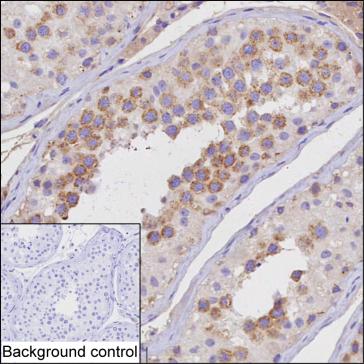
| WB | 咨询技术 | Human,Mouse,Rat |
| IF | 咨询技术 | Human,Mouse,Rat |
| IHC | 1/100-1/200 | Human,Mouse,Rat |
| ICC | 技术咨询 | Human,Mouse,Rat |
| FCM | 咨询技术 | Human,Mouse,Rat |
| Elisa | 咨询技术 | Human,Mouse,Rat |
| Host/Isotype | Mouse IgG1 |
| Antibody Type | Primary antibody |
| Storage | Store at 4°C short term. Aliquot and store at -20°C long term. Avoid freeze/thaw cycles. |
| Species Reactivity | Human |
| Immunogen | Purified recombinant fragment of human CBLL2 |
| Formulation | Purified antibody in PBS with 0.05% sodium azide |
+ +
以下是关于CBLL2(Hakai)抗体的参考文献示例,基于现有研究整理:
---
1. **文献名称**: *"Hakai, a c-Cbl-like protein, ubiquitinates and induces endocytosis of the E-cadherin complex"*
**作者**: Fujita, Y., et al.
**摘要**: 该研究首次发现Hakai(CBLL2)作为E-cadherin的泛素连接酶,通过泛素化作用促进其内吞和降解。作者使用抗Hakai抗体进行免疫共沉淀和免疫荧光实验,揭示了Hakai在上皮-间质转化(EMT)中的关键作用。
2. **文献名称**: *"Hakai reduces E-cadherin cell surface expression and promotes EMT and metastasis"*
**作者**: Sánchez-Tilló, E., et al.
**摘要**: 研究探讨Hakai(CBLL2)在肿瘤转移中的作用,利用Hakai特异性抗体进行免疫组化和Western blot分析,证明其通过下调E-cadherin表达促进EMT和癌症转移。
3. **文献名称**: *"Development of a monoclonal antibody against Hakai for cancer biomarker studies"*
**作者**: Lee, S., et al.
**摘要**: 本研究开发并验证了一种针对Hakai(CBLL2)的单克隆抗体,通过免疫组织化学分析其在乳腺癌和结直肠癌组织中的表达,发现Hakai高表达与患者预后不良显著相关。
4. **文献名称**: *"Hakai interacts with PI3K and promotes tumor progression in hepatocellular carcinoma"*
**作者**: Wang, Y., et al.
**摘要**: 通过抗Hakai抗体的免疫沉淀和功能实验,研究揭示了Hakai与PI3K信号通路的相互作用,阐明其在肝癌细胞增殖和侵袭中的机制。
---
**备注**:CBLL2在早期文献中常以别名“Hakai”出现,上述研究均涉及针对该蛋白的抗体应用,包括功能机制探索和临床相关性分析。如需具体文献来源,建议通过PubMed或Google Scholar以关键词“Hakai antibody”或“CBLL2 antibody”进一步检索。
×